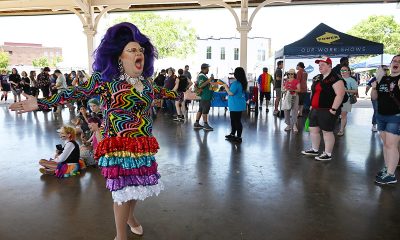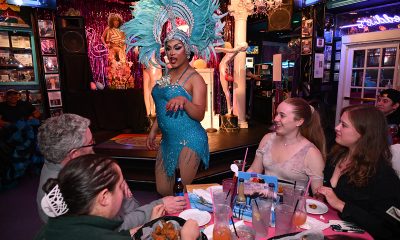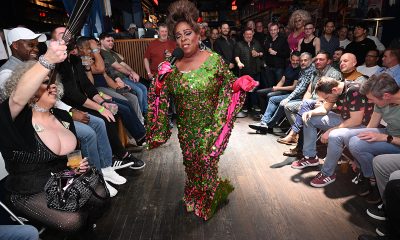Arts & Entertainment
Imperial Court goes glam for Gala
Emperor and Empress IV to be crowned at Sept. 12 event
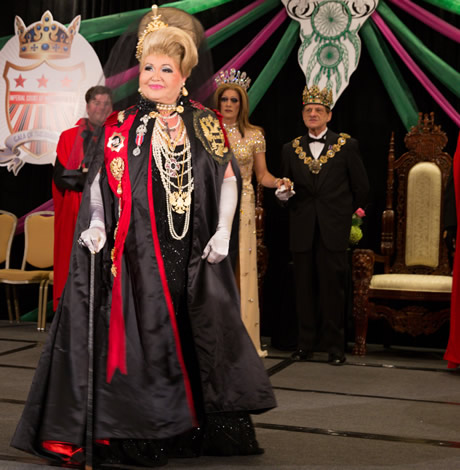
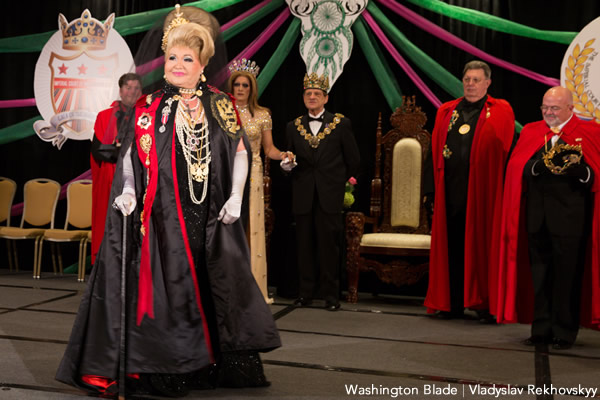
The Imperial Court (Washington Blade file photo by Vladyslav Rekhovskyy)
The Imperial Court of Washington
Coronation IV: Gala of the Americas
A Reel to Real Celebration
Saturday, Sept. 12
Marriott Metro Center
775 12th St., N.W.
7 p.m.
Tickets: $150
The Imperial Court of Washington is gearing up for its biggest event of the year next weekend.
On Saturday, Sept. 12, the court, part of the International Imperial Court System that was founded in San Francisco in 1965 by the late Jose Sarria, will hold its Coronation IV: Gala of the Americas, which celebrates the current reign of the Emperor and Empress III, Manuel Diego Dennis Alicia and Natasha Jewel Dennis Carrington respectively, and crowns their successors — Emperor DP Diego-Dennis Carrington and Empress Muffy Jaymes Jewel Blake Stephyns. Nicole Murray Ramirez, Queen Mother I of the Americas, is the honored guest and will welcome Imperial Court members and supporters from all over the U.S., Canada and perhaps Mexico.
Several other events are planned while the dignitaries are in town. On Thursday, Sept. 10, an “In Town Show” will be held; on Friday, Sept. 11, the “Crowns on the Town” bar tour will occur; a victory brunch and show will be held on Sunday, Sept. 13. Full details at imperialcourtdc.org. Also on Sept. 11, members will hold a Pentagon memorial tribute from 6-8 p.m. in which flowers will be laid on memorials of those who died in the 2001 terrorist attacks.
The Court exists to raise funds for LGBT and HIV/AIDS organizations, social service groups and youth enrichment programs. The Court provides a safe, social environment for people with the same interests. The D.C. chapter is one of 71 courts in the U.S., Canada and Mexico. About 250 attend the D.C. gala each year and it’s open to both court members and non-members. There are about 80 members in the D.C. court, which started in 2011. Members say more than half participate in court events in drag, but not all. Drag queens, drag kings, and non-drag men and women perform in various types of royal attire. The gala is a black-tie event.
The emperor and empress win by running elections. They were announced in late June. Stephyns, this year’s empress, has been involved with the court since 2012 and says it was a natural fit for her.
“I’ve always enjoyed working in the community and using drag as a way to give back, so for me it was a natural fit, Stephyns (aka Daniel Hays) says.
Destiny B. Childs (aka Ric Legg Benavides) was Empress II two years ago and says it’s a demanding job she took very seriously.
“It was humbling and scary and exciting all at the same time,” Childs says. “It’s not a glamorous title, it’s a working title. People hold you in very high esteem and you do nothing but work to raise money all year for your charity organization as you travel all over the country.”
Childs visited Canada, Texas, Rhode Island, Connecticut, Kentucky, New York and more during her reign. Only money raised during the Sunday victory show each year can be used — if the emperor or empress wish — toward travel expenses. Childs got $700 from that event the year she won and says that barely covered one excursion.
“Most of the time we just donate it back to the court,” she says. “I did it because I love and adore the D.C. metro area and I’ve been involved here for over 15 years now. People call me the yes queen because they know if they call and ask me to do something, I’ll say yes.”
This year’s beneficiaries are Rosmy, a Richmond, Va.,-based organization for LGBT youth; the Mautner Project, a lesbian health organization; and the Inova Juniper Program, an HIV/AIDS and primary care provider in Northern Virginia.
Stephyns has already traveled extensively through her work in the court and says she loves it.
“We all have the same central goal of giving back, but when you travel throughout the system, those friendships we make, these are people we never would have known otherwise who become lifelong friends,” she says. “It’s another way to build community.”
Photos
PHOTOS: Montgomery County Pride in the Plaza
LGBTQ celebration held in downtown Silver Spring

Montgomery County Pride in the Plaza was held on Sunday, June 29 at Veterans Plaza in Silver Spring, Md.
(Washington Blade photos by Michael Key)























The fifth annual Fredericksburg Pride march and festival was held on Saturday, June 28. A march through the streets of downtown Fredericksburg, Va. was followed by a festival at Riverfront Park.
(Washington Blade photos by Michael Key)



















India
Anaya Bangar challenges ban on trans women in female cricket teams
Former Indian cricketer Sanjay Bangar’s daughter has received support

Anaya Bangar, the daughter of former Indian cricketer Sanjay Bangar, has partnered with the Manchester Metropolitan University Institute of Sport in the U.K. to assess her physiological profile following her gender-affirming surgery and undergoing hormone replacement therapy.
From January to March 2025, the 23-year-old underwent an eight-week research project that measured her glucose levels, oxygen uptake, muscle mass, strength, and endurance after extensive training.
The results, shared via Instagram, revealed her metrics align with those of cisgender female athletes, positioning her as eligible for women’s cricket under current scientific standards. Bangar’s findings challenge the International Cricket Council’s 2023 ban on transgender athletes in women’s cricket, prompting her to call for a science-based dialogue with the Board of Control for Cricket in India and the ICC to reform policies for transgender inclusion.
“I am talking with scientific evidence in my hand,” Bangar said in an interview posted to her Instagram page. “So, I hope, this makes an impact and I will be hoping to BCCI and ICC talking with me and discussing this further.”
On Nov. 21, 2023, the ICC enacted a controversial policy barring trans women from international women’s cricket. Finalized after a board meeting in Ahmedabad, India, the regulation prohibits any trans player who has experienced male puberty from competing, irrespective of gender-affirming surgery or hormone therapy. Developed through a 9-month consultation led by the ICC’s Medical Advisory Committee, the rule aims to safeguard the “integrity, safety, and fairness” of women’s cricket but has drawn criticism for excluding athletes like Canada’s Danielle McGahey, the first trans woman to play internationally. The policy, which allows domestic boards to set their own rules, is slated for review by November 2025.
Bangar shared a document on social media verifying her participation in a physiological study at the Manchester Metropolitan University Institute of Sport, conducted from Jan. 20 to March 3, 2025, focused on cricket performance. The report confirmed that her vital metrics — including haemoglobin, blood glucose, peak power, and mean power — aligned with those of cisgender female athletes. Initially, her fasting blood glucose measured 6.1 mmol/L, slightly above the typical non-diabetic range of 4.0–5.9 mmol/L, but subsequent tests showed it normalized, reinforcing the study’s findings that her physical profile meets female athletic standards.
“I am submitting this to the BCCI and ICC, with full transparency and hope,” said Bangar. “My only intention is to start a conversation based on facts not fear. To build space, not divide it.”
In a letter to the BCCI and the ICC, Bangar emphasized her test results from the Manchester Metropolitan University study. She explained that the research aimed to assess how hormone therapy had influenced her strength, stamina, haemoglobin, glucose levels, and overall performance, benchmarked directly against cisgender female athletic standards.
Bangar’s letter to the BCCI and the ICC clarified the Manchester study was not intended as a political statement but as a catalyst for a science-driven dialogue on fairness and inclusion in cricket. She emphasized the importance of prioritizing empirical data over assumptions to shape equitable policies for trans athletes in the sport.
Bangar urged the BCCI, the world’s most influential cricket authority, to initiate a formal dialogue on trans women’s inclusion in women’s cricket, rooted in medical science, performance metrics, and ethical fairness. She called for the exploration of eligibility pathways based on sport-specific criteria, such as haemoglobin thresholds, testosterone suppression timelines, and standardized performance testing. Additionally, she advocated for collaboration with experts, athletes, and legal advisors to develop policies that balance inclusivity with competitive integrity.
“I am releasing my report and story publicly not for sympathy, but for truth. Because inclusion does not mean ignoring fairness, it means measuring it, transparently and responsibly,” said Bangar in a letter to the BCCI. “I would deeply appreciate the opportunity to meet with you or a representative of the BCCI or ICC to present my findings, discuss possible policy pathways, and work towards a future where every athlete is evaluated based on real data, not outdated perceptions.”
Before her transition, Bangar competed for Islam Gymkhana in Mumbai and Hinckley Cricket Club in the U.K., showcasing her talent in domestic cricket circuits. Her father, Sanjay Bangar, was a dependable all-rounder for the Indian national cricket team from 2001 to 2004, playing 12 test matches and 15 One Day Internationals. He later served as a batting coach for the Indian team from 2014 to 2019, contributing to its strategic development.
Cricket in India is a cultural phenomenon, commanding a fanbase of more than 1 billion, with more than 80 percent of global cricket viewership originating from the country.
The International Cricket Council, the sport’s governing body, oversees 12 full member nations and more than 90 associate members, with the U.S. recently gaining associate member status in 2019 and co-hosting the 2024 ICC Men’s T20 World Cup. The BCCI generated approximately $2.25 billion in revenue in the 2023–24 financial year, primarily from the Indian Premier League, bilateral series, and ICC revenue sharing. The ICC earns over $3 billion from media rights in India alone for the 2024–27 cycle, contributing nearly 90 percent of its global media rights revenue, with the BCCI receiving 38.5 percent of the ICC’s annual earnings, approximately $231 million per year.
Women’s cricket in India enjoys a growing fanbase, with over 300 million viewers for the Women’s Premier League in 2024, making it a significant driver of the sport’s global popularity. The International Cricket Council oversees women’s cricket in 12 full member nations and over 90 associate members, with the U.S. fielding a women’s team since gaining associate status in 2019 and competing in ICC events like the 2024 Women’s T20 World Cup qualifiers. The BCCI invests heavily in women’s cricket, allocating approximately $60 million annually to the WPL and domestic programs in 2024–25, while contributing to the ICC’s $20 million budget for women’s cricket development globally. India’s media market for women’s cricket, including WPL broadcasting rights, generated $120 million in 2024, accounting for over 50 percent of the ICC’s women’s cricket media revenue.
“As a woman, I feel when someone says that they are women, then they are, be trans or cis. A trans woman is definitely the same as a cis woman emotionally and in vitals, and specially, when someone is on hormone replacement therapy. Stopping Anaya Bangar from playing is discrimination and violation of her rights. It is really sad and painful that every transwoman need to fight and prove their identity everywhere,” said Indrani Chakraborty, an LGBTQ rights activist and a mother of a trans woman. “If ICC and BCCI is stopping her from playing for being transgender, then I will say this to be their lack of awareness and of course the social mindsets which deny acceptance.”
Chakraborty told the Blade that Bangar is an asset, no matter what. She said that the women’s cricket team will only benefit by participation, but the discriminating policies are the hindrance.
“Actually the transgender community face such discrimination in every sphere. In spite of being potent, they face rejection. This is highly inhuman. These attitudes is regressive and will never let to prosper. Are we really in 2025?,” said Chakraborty. “We, our mindset and the society are the issues. We, as a whole, need to get aware and have to come together for getting justice for Anaya. If today, we remain silent, the entire community will be oppressed. Proper knowledge of gender issues need to be understood.”
The BCCI and the International Cricket Council have not responded to the Blade’s repeated requests for comment.
-

 U.S. Supreme Court5 days ago
U.S. Supreme Court5 days agoSupreme Court upholds ACA rule that makes PrEP, other preventative care free
-

 U.S. Supreme Court5 days ago
U.S. Supreme Court5 days agoSupreme Court rules parents must have option to opt children out of LGBTQ-specific lessons
-
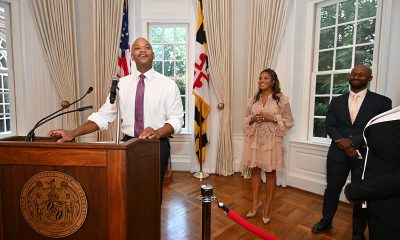
 Maryland5 days ago
Maryland5 days agoWes Moore hosts annual Pride reception
-

 District of Columbia5 days ago
District of Columbia5 days agoActivists protest outside Hungarian Embassy in DC

